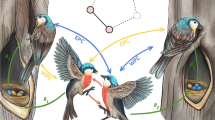Summary
The prisoner's dilemma of game theory provides a possible explanation for communal breeding in the pukeko (Porphyrio porphyrio, Aves) where group breeding birds are at a reproductive disavantag compared to pairs. Territorial defence is largely the realm of males. A male who ‘defect’ on neighbours by taking in an extra male defender and so becoming communal stands to gain territorial area and possibly higher reproductive success. Neighbours are forced to follow suit if additional males are available or lose their territory and therefore their breeding opportunities. If neighbours also admit an extra defender, the initial ‘defector’ loses his advantages and all males end up with the lower breeding success of communal groups. Such ‘defection’ to a communal habit appears to be the only stable solution.
Similar content being viewed by others
References
Axelrod R, Hamilton WD (1981) The evolution of cooperation. Science 211:1390–1396
Brown JL (1978) Avian communal breeding systems. Annu Rev Ecol Syst 9:123–155
Brown JL, Brown ER (1980) Kin selection and individual fitness in babblers. In: Alexander RD, Tinkle D (eds) Natural selection and social behaviour: recent results and new theory. New York, Chiron, pp 255–256
Craig JL (1976) An interterritorial hierarchy: an advantage for a subordinate in a communal territory. Z Tierpsychol 42:200–205
Craig JL (1979) Habitat variation in the social organization of a communal gallinule, the pukeko, Porphyrio porphyrio melanotus. Behav ecol Sociobiol 5:331–358
Craig JL (1980a) Breeding success of a communal gallinule. Behav Ecol Sociobiol 6:289–295
Craig JL (1980b) Pair and group breeding behaviour of a communal gallinule, the pukeko, Porphyrio porphyrio melanotus. Anim Behav 28:593–603
Dawkins R (1980) Good strategy or evolutionarily stable strategy? In: Barlow GW, Silverberg J (eds) Sociobiology: beyond nature/nurture? AAAS, Washington, DC, pp 331–361
Emlen ST (1978) The evolution of cooperative breeding in birds. In: Krebs JR, Davies NB (eds) Behaviural ecology: an evolutionary approach. Blackwell, Oxford, pp 245–281
Hamilton WD (1971) Selection of selfish and altruistic behaviour in some extreme models. In: Eisenberg JF, Dillon WS (eds) Man and beast: comparative social behaviour. Smithsonian Institution Press. Washington, DC, pp 57–91
Wade MJ, Breden F (1980) The evolution of cheating and selfish behaviour. Behav Ecol Socibiol 7:167–172
White CS (1982) Helping behaviour of the pukeko. Unpubl M Sc thesis, University of Auckland
Author information
Authors and Affiliations
Rights and permissions
About this article
Cite this article
Craig, J.L. Are communal pukeko caught in the prisoner's dilemma?. Behav Ecol Sociobiol 14, 147–150 (1984). https://doi.org/10.1007/BF00291905
Received:
Accepted:
Issue Date:
DOI: https://doi.org/10.1007/BF00291905




